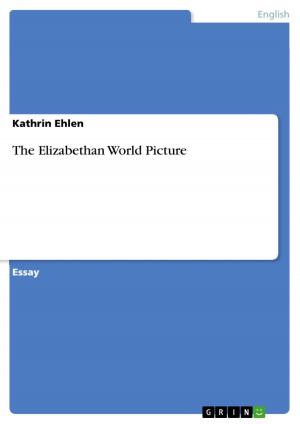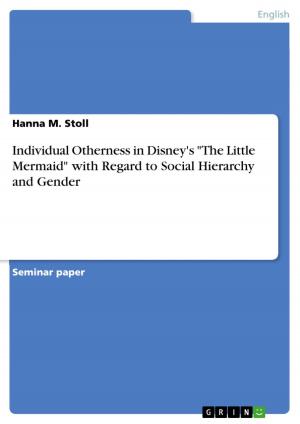| Author: | Olivia Frey | ISBN: | 9783640526420 |
| Publisher: | GRIN Publishing | Publication: | February 2, 2010 |
| Imprint: | GRIN Publishing | Language: | English |
| Author: | Olivia Frey |
| ISBN: | 9783640526420 |
| Publisher: | GRIN Publishing |
| Publication: | February 2, 2010 |
| Imprint: | GRIN Publishing |
| Language: | English |
Seminar paper from the year 2010 in the subject American Studies - Linguistics, grade: 1,0, University of Vienna (Institut für Anglistik & Amerikanistik), course: Linguistics Seminar: Metaphor and Cognitive Models, language: English, abstract: 'Metaphor is for most people a device of the poetic imagination and the rhetorical flourish - a matter of extraordinary rather than ordinary language. [...] We have found, on the contrary, that metaphor is pervasive in everyday life, not just in language but in thought and action. Our ordinary conceptual system, in terms of which we both think and act, is fundamentally metaphorical in nature' (Lakoff and Johnson 1980: 3). Taking this statement into account, one might ask where the boundaries between literary and ordinary language in terms of metaphoricity are or whether they exist at all. Metaphor is obviously neither an exclusively literary device in the sense of a defining feature of literature. Nevertheless, the scope of this paper is to show that literary metaphor has a special status not only because of its distinct features, but also due to a special way of processing and interpretation on the part of the reader. In order to situate these two aspects of literary metaphor within a theoretical literary framework, two basic approaches to the concept of literariness - a textual and a contextual one - are taken as a starting point. Building on this theoretical basis, the concept of literary metaphor is linked with each of these two definitions of literariness in order to show that it can be analyzed from a purely formal and stylistic as well as from a reader-related perspective, both contributing to the distinct characteristics of literary metaphor.
Seminar paper from the year 2010 in the subject American Studies - Linguistics, grade: 1,0, University of Vienna (Institut für Anglistik & Amerikanistik), course: Linguistics Seminar: Metaphor and Cognitive Models, language: English, abstract: 'Metaphor is for most people a device of the poetic imagination and the rhetorical flourish - a matter of extraordinary rather than ordinary language. [...] We have found, on the contrary, that metaphor is pervasive in everyday life, not just in language but in thought and action. Our ordinary conceptual system, in terms of which we both think and act, is fundamentally metaphorical in nature' (Lakoff and Johnson 1980: 3). Taking this statement into account, one might ask where the boundaries between literary and ordinary language in terms of metaphoricity are or whether they exist at all. Metaphor is obviously neither an exclusively literary device in the sense of a defining feature of literature. Nevertheless, the scope of this paper is to show that literary metaphor has a special status not only because of its distinct features, but also due to a special way of processing and interpretation on the part of the reader. In order to situate these two aspects of literary metaphor within a theoretical literary framework, two basic approaches to the concept of literariness - a textual and a contextual one - are taken as a starting point. Building on this theoretical basis, the concept of literary metaphor is linked with each of these two definitions of literariness in order to show that it can be analyzed from a purely formal and stylistic as well as from a reader-related perspective, both contributing to the distinct characteristics of literary metaphor.















